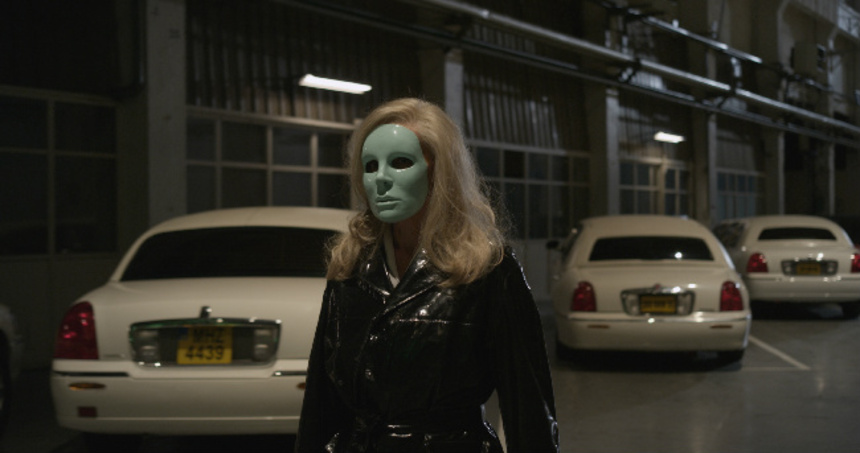Cannes 2012 Review: HOLY MOTORS Shoots Past the Moon

First, a bit of history about Carax: He emerged in the 80's as a poster-boy for new French cinema with the one-two combo of Boy Meets Girl and Mauvais Sang, which both infused a romantic French New Wave style with a sense of punk rock abandon. His next film, Lovers on the Bridge took this style to its extreme, but went way over budget and schedule and ended up bankrupting several production companies, which made it much harder for Leos Carax to work. Rather than reign in his ambition, he made Pola X, a frustrating, insane and, in my opinion, totally brilliant, adaptation of the Herman Melville book that turned most critics against the author. The movie's reception wasn't any warmer, and with a few notable exceptions including Roger Ebert and director Jacques Rivette, it was panned upon release.
That was thirteen years ago. Since then, he popped in to direct the short Merde, which was by far the most memorable segment of the omnibus film Tokyo, but has been otherwise silent. As it turns out though, his imagination has been going wild, and the result is this absurd, energetic collection of sketches performed by one man with many identities.
That man is Monsieur Oscar (played by longtime Carax collaborator/alter-ego Denis Lavant), a mysterious character who rides around Paris in a limousine from dawn to midnight, disembarking in intervals for different "appointments." These appointments, which he and his driver discuss as if they were banal meetings, involve Lavant literally becoming somebody else and carrying out some sort of action or performance. As usual, Lavant is versatile, physical and hilarious, and Carax expertly exploits these qualities. Oscar becomes, among other things, a hired killer, a business man, the character he played in Merde and a father. If this doesn't make total sense, don't worry about it. Holy Motors is an absurd film through and through, and if you get bogged down with reductive questions like "What is it about?" and "What does it mean?" you're not going to have any fun.
And the film really is a lot of fun. Carax directs with his gusto and spontaneity cranked to 11 -- imagine an entire movie in the same spirit as the much-loved David Bowie dance scene in Mauvais Sang and you're part of the way there. The film also calls to mind some of Luis Buñuel's later work, but those films don't feel anywhere near as spontaneous. In addition to the style and energy, the film also deals in images that, to my knowledge, have not been put on screen before. If you don't feel an exhilarating gust of excitement during the sex scene in a motion capture room or and the impromptu accordion jam in what looks like Saint-Eustache church, you may want to check your pulse. While viewers used to mainstream, plot-driven films may be a bit baffled by the movie as a whole, it's hard to imagine anyone not having a good time.
All that said, the film is not merely a collage of what-the-fuck moments and inspired craziness. There is also a sense of sadness, wonder and angst lurking moment to moment beneath the surface of Carax's reckless joy, and while I feel like analyzing the film in any objective sense is missing the point, I will say that Holy Motors made me reflect deeply on modern life, performance, technology, regret, death, love and cinema itself... occasionally all at the same time.
As with any film with such an episodic structure, some sequences are more memorable than others, but as a whole, the film is incredibly consistent, veering from physical humor to manic energy to melancholy with a sure, light touch. Also, Carax proves again that he's a modern master at shooting Paris, finding locations that make the city feel new again even after Woody Allen turned every corner into a postcard with last year's Midnight in Paris. It lacks the epic, baroque ambition of Pola X, and, while many beg to differ, I suspect that movie will still remain closer to my heart than any of Carax's work thus far. But hell, the man seems happier this time around, or at least more interested in sharing joy with the audience, and Holy Motors is the most audacious, go-for-broke return of a major director since Seijun Suzuki's Pistol Opera. Here's hoping we don't have to wait another thirteen years for his next feature.
Holy Motors
Director(s)
- Leos Carax
Writer(s)
- Leos Carax (screenplay)
Cast
- Denis Lavant
- Edith Scob
- Eva Mendes
- Kylie Minogue

Do you feel this content is inappropriate or infringes upon your rights? Click here to report it, or see our DMCA policy.






